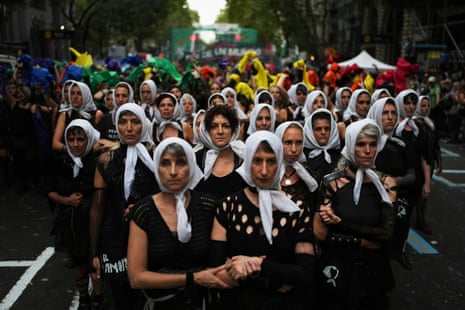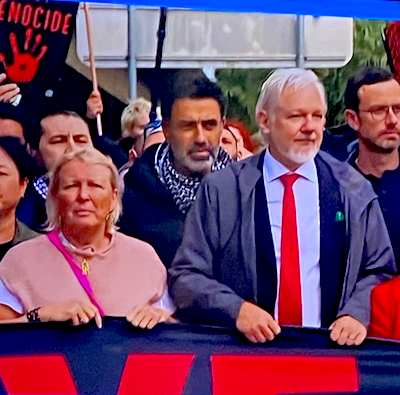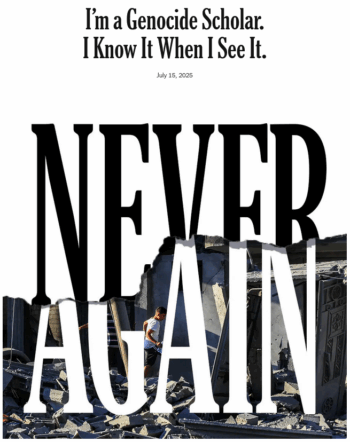
Omer Bartov (New York Times, 7/15/25): “Israel’s actions could be understood only as the implementation of the expressed intent to make the Gaza Strip uninhabitable for its Palestinian population.”
More than a year ago, the Intercept (4/15/24) reported on a leaked internal New York Times memo from the newspaper’s management, telling its reporters covering Gaza to “restrict the use of the terms ‘genocide’ and ‘ethnic cleansing.’” About “genocide” specifically, the memo decreed, “We should…set a high bar for allowing others to use it as an accusation, whether in quotations or not.”
That bar appears to have extended to paid advertising at the paper: The American Friends Service Committee (1/8/25), a Quaker organization, said it had “canceled planned advertising with the New York Times after the paper refused to allow an ad that referred to Israel’s genocide in Gaza.”
The Times made waves, then, when it published an op-ed by prominent Israeli genocide scholar Omer Bartov (7/15/25) arguing that it is “no longer possible to deny that the pattern of IDF operations was consistent with the statements denoting genocidal intent made by Israeli leaders.” Bartov concluded: “Israel is committing genocide against the Palestinian people.”
Two weeks later, the opinion page also ran an op-ed (7/30/25) by three writers, two of whom are from Physicians for Human Rights Israel, which said: “Through the wholesale destruction of Gaza’s health care system, Israel is committing genocide, but on a longer timeline than direct killing would imply.” The writers argued: “This is not a genocide that can still be prevented. That threshold has already been crossed. What remains is a long trajectory of harm.”
‘War for a just cause’
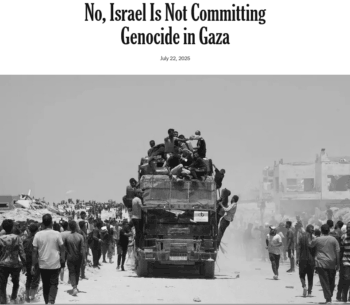
Bret Stephens (New York Times, 7/22/25): “If genocide…is to retain its status as a uniquely horrific crime, then the term can’t be promiscuously applied to any military situation we don’t like.”
From July 15, when Bartov’s op-ed ran, through the end of July, the opinion page published eight pieces that used the word “genocide” in the context of Gaza, whether accusatory, defensive or neutral; in the entire 12 months prior, it had only run 38 such pieces, or less than one a week.
True, the Times‘ own columnists and readers were quick to decry Bartov’s conclusion. Columnist Bret Stephens (New York Times, 7/22/25) argued that Israel’s actions couldn’t be considered genocidal because many Palestinians were still alive, which is like saying the existence of the Kardashians disproved the Armenian genocide.
In a piece acknowledging Israel’s war is “unjust,” Times columnist Ross Douthat (7/26/25) likewise flatly denied the “genocide” label in his very first sentence, while applying it (“potentially”) to Hamas:
Israel’s war in Gaza is not a genocide. It is a war for a just cause, the elimination of a cruel, fanatical, itself potentially genocidal terrorist organization that oppresses its own people, holds innocent hostages and will pose a severe danger to the state of Israel so long as it holds power.
Nor does the publication of Bartov’s op-ed appear to mark a change in the editors’ willingness to apply the label themselves. The Times editorial board (7/30/25) ran a subsequent piece calling the starvation in Gaza a “moral crisis,” but refuses to invoke the accusation of genocide in its plainest form, instead painting the forced starvation as the opposite of intentional: “Israel’s often reckless administration of its war and occupation has helped create this emergency.”
Late last year, the Times (12/5/24) reported that Amnesty International “became the first major international human rights organization to accuse Israel of carrying out genocide in Gaza,” adding that the accusation drew “rebuke from Israeli officials who denied the claim.”
And even before the Intercept story dropped, the Times (1/26/24) reported on the International Court of Justice “ordering Israel to take proactive steps to ensure genocide doesn’t occur in the future.”
But the recent Bartov piece is different than these types of articles, in that it is a full-throated accusation of genocide against Israel, not a debate or a winding discussion about the use of the word in conflicts, as the Times had featured in its magazine (8/20/24). Bartov is an Israeli, and a noted scholar on the subject of genocide. It’s tough even for hardened partisans like Stephens to counter that with sanctimonious bluster on the opinion page.
‘Crucial to warn’
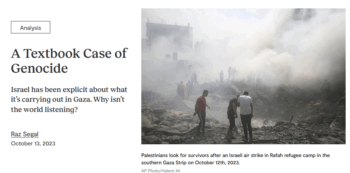
Raz Segal (Jewish Currents, 10/13/23): “Israel’s genocidal assault on Gaza is quite explicit, open and unashamed. Perpetrators of genocide usually do not express their intentions so clearly.”
However, Bartov is not the first of his kind. Raz Segal is also a noted Israeli scholar of genocide, and published his essay “A Textbook Case of Genocide” (Jewish Currents, 10/13/23) in the earliest stages of Israel’s retribution campaign in Gaza. (Bartov cited Segal in his Times opinion piece.) Segal’s piece was covered in the wider press (including, belatedly, the Times—10/23/24), because it led to the University of Minnesota revoking a job offer to him (Democracy Now!, 6/18/24; Center for Constitutional Rights, 7/31/24).
Interestingly, Bartov wrote in the Times (11/10/23) two years ago that while he admitted war crimes were taking place, “as a historian of genocide, I believe that there is no proof that genocide is currently taking place in Gaza.” In both his latest op-ed and an interview with the Times (7/23/25), he said his opinion fundamentally changed in May of 2024.
Bartov spoke to other news outlets, like Democracy Now! (12/30/24), about the application of the genocide label in Gaza in that time period. And he wrote publicly (Guardian, 8/13/24) of his change in opinion, citing his 2023 Times op-ed:
On 10 November 2023, I wrote in the New York Times: “As a historian of genocide, I believe that there is no proof that genocide is now taking place in Gaza, although it is very likely that war crimes, and even crimes against humanity, are happening…. We know from history that it is crucial to warn of the potential for genocide before it occurs, rather than belatedly condemn it after it has taken place. I think we still have that time.”
I no longer believe that. By the time I traveled to Israel, I had become convinced that at least since the attack by the IDF on Rafah on 6 May 2024, it was no longer possible to deny that Israel was engaged in systematic war crimes, crimes against humanity and genocidal actions.
But while Bartov’s change in opinion was published in the Guardian, his latest for the Times came a year later. Bartov explained to FAIR in an email:
I was approached by Dan Wakin of the New York Times in May to write an op-ed and we worked on it intensely together until its publication. I have learned not to propose op-eds—never had luck with that—but am happy to write them when asked.
Other witnesses
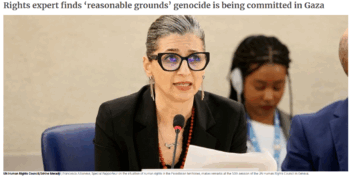
Special rapporteur Francesca Albanese (UN News, 3/26/24): “The genocide in Gaza is the most extreme stage of a longstanding settler-colonial process of erasure of the native Palestinians.”
But even in the early days of the war, others called attention to the possibility of genocide. The UN’s Office of the High Commissioner for Human Rights (11/16/23) said, only a month after the Hamas attack on Israel that instigated the current crisis in Gaza:
Grave violations committed by Israel against Palestinians in the aftermath of 7 October, particularly in Gaza, point to a genocide in the making, UN experts said today. They illustrated evidence of increasing genocidal incitement, overt intent to “destroy the Palestinian people under occupation,” loud calls for a “second Nakba” in Gaza and the rest of the occupied Palestinian territory, and the use of powerful weaponry with inherently indiscriminate impacts, resulting in a colossal death toll and destruction of life-sustaining infrastructure.
Francesca Albanese, the United Nations special rapporteur on the Occupied Palestinian Territories, has also made the case to invoke the genocide charge clear (UN News, 3/26/24):
Following nearly six months of unrelenting Israeli assault on occupied Gaza, it is my solemn duty to report on the worst of what humanity is capable of, and to present my findings…. There are reasonable grounds to believe that the threshold indicating the commission of the crime of genocide…has been met.
Said Christopher Lockyear, secretary general of Doctors Without Borders (12/19/24):
What our medical teams have witnessed on the ground throughout this conflict is consistent with the descriptions provided by an increasing number of legal experts and organizations concluding that genocide is taking place in Gaza.
In the early days of the war, around 800 genocide scholars—including Segal and Bartov—signed a public statement (OpinioJuris, 10/18/23; Common Dreams, 10/18/23) sounding “the alarm about the possibility of the crime of genocide being perpetrated by Israeli forces against Palestinians in the Gaza Strip.” More than a year and half ago, Israeli columnist Gideon Levy (Haaretz, 1/14/24) wrote a piece called “If It Isn’t a Genocide in Gaza, Then What Is It?”
‘They have no right to exist’
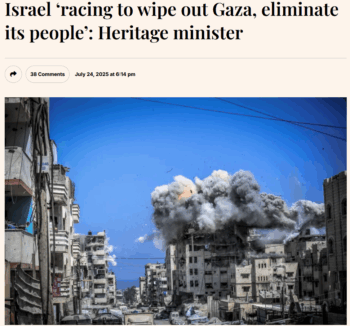
“We do not need to deal with Gaza’s hunger,” said Israeli Heritage Minister Amichai Eliyahu (Middle East Monitor, 7/24/25). Gaza will become “entirely Jewish.”
In other words, there was plenty of talk outside of the Times in the time after the Intercept leak and before the Bartov piece describing what Israel was doing as not just heavy-handed war, but actual genocide. After Israeli Education Minister Yoav Kisch (10/9/23) said, “Those are animals, they have no right to exist…. They need to be exterminated,” a warning about genocide on the Times opinion page could have forced more people to grapple with this reality.
There are many other examples of genocidal declarations, like a former lawmaker saying on Israeli television (X, 5/21/25): “The enemy is not Hamas. Every child, every baby in Gaza is an enemy.” A prominent Israeli television producer (New Arab, 5/5/25) made
social media posts in which he called for a “Holocaust” against the people of Gaza…referencing the methods used during the Nazi genocide of European Jews, including gas chambers and deportation trains.
Israel’s government is “racing against time to wipe out Gaza and its Palestinian population,” Heritage Minister Amichai Eliyahu told Israeli radio (Middle East Monitor, 7/24/25). “We are eliminating this evil. We are eliminating its residents.”
‘What they do shapes standards’

Eric Reinhart (The Nation, 3/26/25) has called out other elite publications for whitewashing genocide–such as the New England Journal of Medicine (3/22/25), which published without disclosure a piece on Gaza about “the power of healthcare to overcome animosity” that was co-authored by a veteran of the Israeli military’s Special Intelligence Unit.
For Eric Reinhart, an anthropologist and clinician who has written for the Nation and Scientific American, this has been incredibly frustrating, because he and other writers have been trying, unsuccessfully, to submit articles on the Gaza genocide issue for the Times since the beginning of this war. “There was a rather systematic exclusion,” he said, noting that he and other scholars were writing that “there was a genocide as declared by the intent of the Israeli government.”
Reinhart noted that after these attempts to print the issue of genocide at the Times the Bartov piece was finally published in the Times, as well as the Physicians for Human Rights Israel op-ed. This seemed to confirm his suspicion that the Times preferred Israelis speak to this issue, rather than non-Israelis. “It’s an absolutely obscene way to approach this,” he said.
This isn’t just a stylistic criticism. Reinhart said that the Times’ opinion page carries political weight, and sounding the alarm on genocide earlier could have had an impact. “What they do shapes standards, which influences policies and influences politicians,” he said.
With Gaza practically obliterated and starvation raging, the Bartov piece is welcome, but it might be too little, too late in terms of pressuring world powers into making substantive change. Even if it does lead to a change in US policy in the region to restrain Israel, the world will look at Gaza as it once gazed upon the ruins in Bosnia and Rwanda. And the people will wonder why outlets like the New York Times didn’t change their tune sooner.
Research assistance: Shirlynn Chan
This post was originally published on FAIR.
